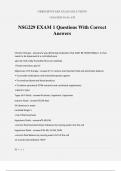©BRIGHTSTARS EXAM SOLUTIONS
11/16/2024 10:16 AM
NSG229 EXAM 1 Questions With Correct
Answers
Infusion therapy - answer✔a way delivering medication that CANT BE TAKEN ORALLY. or that
needs to be dispensed at a controlled pace
-give pt med orally if possibly (if pt can swallow).
-if food restriction, give IV
Objectives of IV therapy - answer✔• To restore and maintain fluid and electrolyte balance
• To provide medications and chemotherapeutic agents
• To transfuse blood and blood products
• To deliver parenteral (TPN) nutrients and nutritional supplements
-CHECK IV Q2H
Types of IV fluids - answer✔isotonic, hypotonic, hypertonic
Isotonic fluids - answer✔0.9% Nacl
5% dextrose in water
Lactated Ringer's
-risk of fluid overload
Hypotonic fluids - answer✔0.45% NS
-corrects fluid and electrolyte imbalance by moving water into the cell
hypertonic fluids - answer✔3% NS, 5% NS, D5W
-corrects fluid balance by moving water OUT of the cell
-pt is prob intercellularly "WET"
1|Page
, ©BRIGHTSTARS EXAM SOLUTIONS
11/16/2024 10:16 AM
Nursing management of fluid volume deficit - answer✔-I&Os: measure all fluids that enter and
leave the body
-Laboratory values: check electrolytes, CBC, and urine-specific gravity
-Cardiovascular: assess for hypotension and weak pulses (hypotension b/c dry. no fuel)
-Respiratory: Assess respiratory system and tissue perfusion
-Assess: Check orientation, vision, hearing, reflexes, and muscle strength
-Daily weights: check for weight changes (pt wt will be low)
-Oral and skin care: check for skin breakdown and good oral care (q2h oral care)
-BP LOW
-HR HIGH
-O2 LOW?
Nursing management of fluid volume excess - answer✔-I/O
-daily wt
-fluid restrictions
-watch for edema
-freq respiratory assessments (cough, deep breathe, give lasix)
-check LOC (CONFUSION = #1 SIGN OF HYPOXIA)
-turn q2h
-high fowlers
-vitals
-call dr
-reassess
fluid volume deficit - answer✔hypovolemia, dehydration, diarrhea, DI.
2|Page
, ©BRIGHTSTARS EXAM SOLUTIONS
11/16/2024 10:16 AM
• S/s: ^HR, hypotension, dysrhythmias, ^RR, dyspnea, lethargic, weakness, decreased UO,
tenting, constipation
• Rx: IVF, O2
fluid volume excess - answer✔hypervolemia: water intoxication d/t excessive Na intake,
• S/s: ^HR, ^BP, distended neck veins, dysrthymias, ^RR, altered LOC, ^UO, pitting edema,
diarrhea,
• Rx: diuretics, restrict fluid/Na, monitor I&O, monitor daily weight
Whole blood - answer✔plasma = 55%
other formed elements 45%
Bone marrow - answer✔functional site of blood formation in adults and produced RBC
components of the blood - answer✔RBC
WBC
Plasma
Platelets
RBC - answer✔largest portion of blood cells, produce hemoglobin
-120 day life cycle
hemoglobin - answer✔An iron-containing protein in red blood cells that reversibly binds
oxygen.
WBC - answer✔functions towards inflammation and immunity
Plasma - answer✔liquid portion divided by 3 types of proteins
3 types of plasma proteins - answer✔albumins, globulins, fibrinogen
Albumin - answer✔type of plasma protein. maintains osmotic pressure of blood (keeps plasma
from leaking into tissues)
-edema ; turn, move, elevate pt
Globulins - answer✔type of plasma protein. transports antibodies and protects body from
infection
3|Page
, ©BRIGHTSTARS EXAM SOLUTIONS
11/16/2024 10:16 AM
Fibrinogen - answer✔type of plasma protein.. critical in the blood clotting process, forms
*fibrin*
Platelets - answer✔blood cells, formed in the marrow and stick together to plug injured vessel
wall
Erythropoietin - answer✔selective growth of bone marrow stem cells into mature erythrocytes.
must be regulated to ensure oxygen perfusion and clotting to occur.
-too many=thick blood decreased flow
Erythropoiesis - answer✔process of RBC formation
What produces erythropoietin? - answer✔kidneys
-pts w/ kidney failure on dialysis= destroying RBC
Hypoxia - answer✔stimulates *increased release* of erythropoietin
-TOO MUCH E
Hyperoxia - answer✔*slows down* release of erythropoietin
-NOT ENOUGH E
The role of the Spleen in blood formation - answer✔spleen destroys old, imperfect RBCs,
breaks down hemoglobin, and stores and filters antigens
-spleen is made up of 3 types of tissue
Spleen tissue types - answer✔white pulp
red pulp
marginal pulp
red pulp - answer✔type of spleen tissue that stores rbc and plts
white pulp - answer✔type of spleen tissue that stores WBC; antibody production
marginal pulp - answer✔type of spleen tissue that contains the end of blood vessels. spleen is
very vascular
The role of the Liver in blood formation - answer✔-prothrombin and clotting factor prodution
-assists in vitamin K formation of the intestinal tract
4|Page




